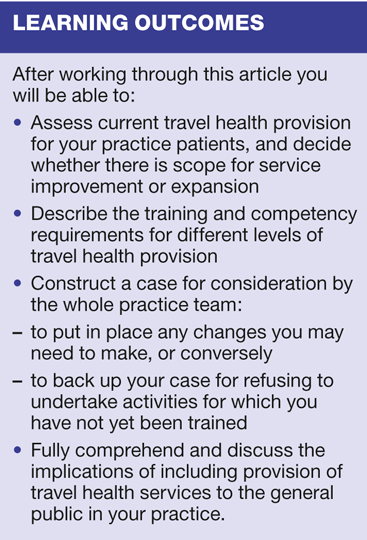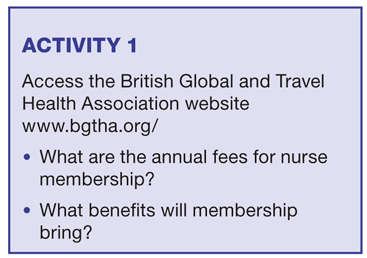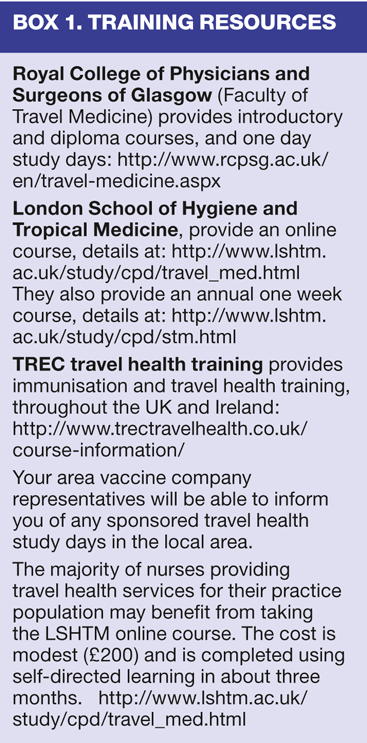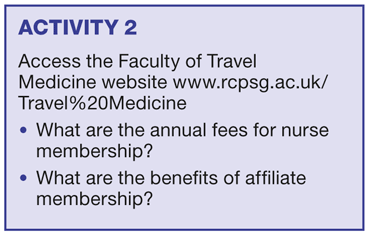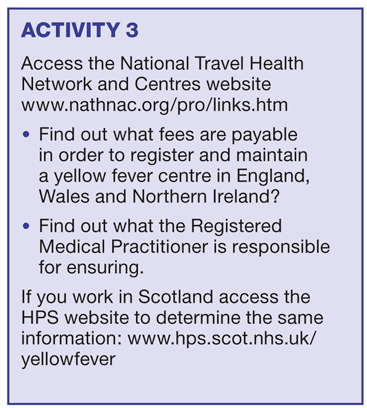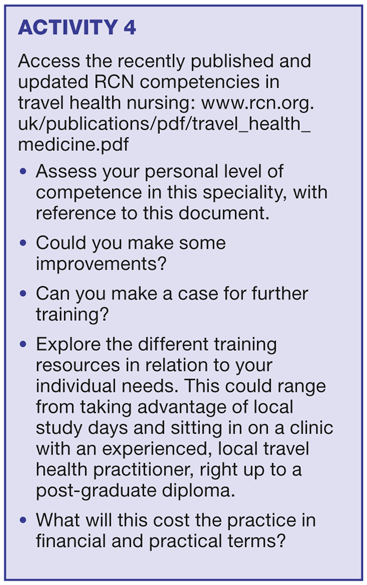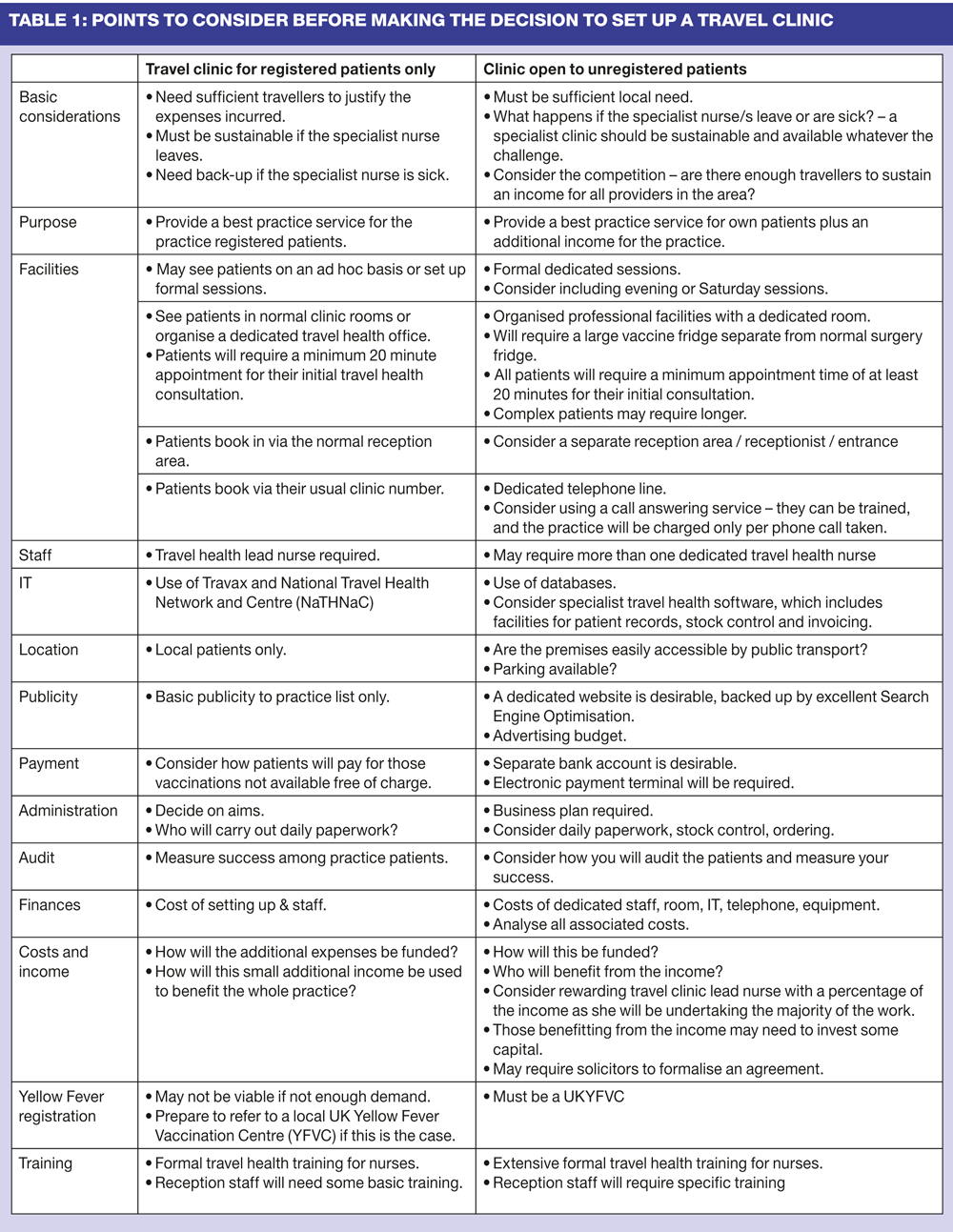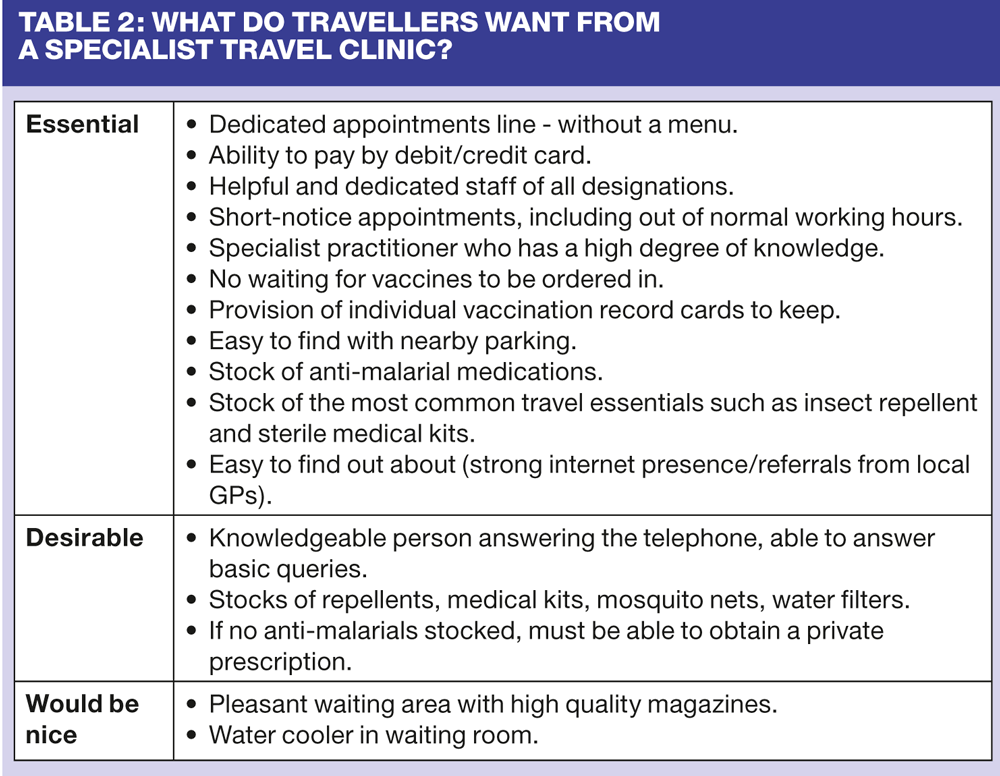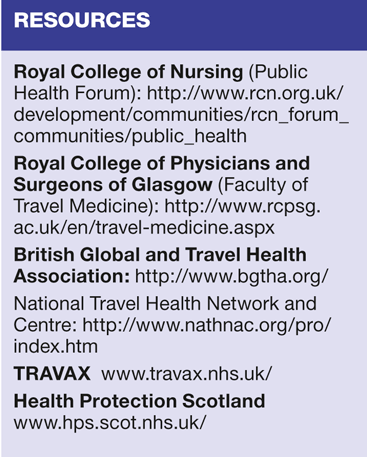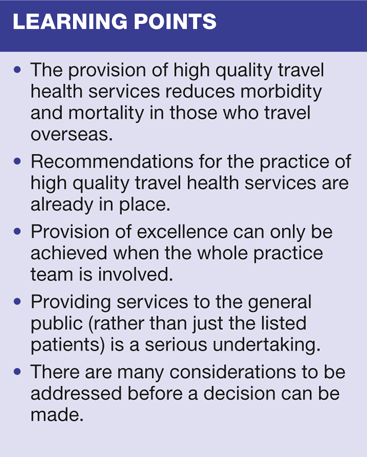Travel clinics in primary care: Things to think about before you start
Sarah Buckley
Sarah Buckley
RN, NIP, Dip Trav Med (RCPS Glas)
Member of the Faculty of Travel Medicine (RCPS Glas) Specialist nurse practitioner& owner of The Globe Travel Health Centre, Norwich
Travel health is becoming increasingly complex. If you are thinking of setting up and running a travel clinic in your practice there are a number of things you should consider in order to make the right decision.
Travel health is becoming increasingly complex as more people travel to exotic and faraway places. There is a growing need for the provision of high quality travel health services for all patients. This article sums up the training and other requirements necessary for providing such a service in a primary care setting, and looks at how these might differ when the practice team considers opening this service up to the general public as well as their registered patients.
BACKGROUND
Every year UK residents take up to 70 million trips abroad, constituting about 8% of all trips taken globally. Travel abroad may include holidays, business trips, gap year experiences and visits to family and friends. This also translates into millions of episodes of illness and injury, not only distressing and disruptive to the traveller, but also costly for the NHS.
The majority of health problems related to travel are preventable, but travellers are often unaware of the health risks and may lack an understanding of the measures necessary to avoid them. Travel health professionals have a significant opportunity to provide the advice and information necessary to reduce risk.1 However, it has been noted that GPs do not always offer the best advice and support to travellers,2 and that practice nurses offer more pre-travel health advice and vaccinations than any other group of health professionals.3 Unfortunately there is also ample evidence that advice given to travellers (including malaria prevention advice) by insufficiently trained healthcare professionals is inadequate,4 leading to serious consequences for the morbidity and mortality of travellers.5
Formal training and qualifications in travel medicine were introduced in the UK in 1995, and travel medicine was formally recognised as a medical speciality in the UK when the Royal College of Physicians and Surgeons of Glasgow (RCPSG) set up the Faculty of Travel Medicine in 2006.6 The college remains the only Royal College in the world not only to have a dedicated travel medicine faculty, but also to admit nurses and pharmacists to the faculty. At the time of writing, however, travel medicine remains unrecognised as a speciality under UK legislation as regards the education of qualified medical practitioners.
NURSE COMPETENCIES AND TRAINING
Practice nurses undertake specific training to equip them for running nurse-led primary care services in specialities such as asthma and diabetes. If they wish to offer the best standards of care to any travel medicine patients they should also be prepared to undertake specialist travel medicine training. The recently published Royal College of Nursing (RCN) document on competence in travel health nursing,7 describes the expected competencies for nurses working in the field of travel medicine.
A 'competent' nurse would be able to provide basic travel health services for practice patients, including provision of those vaccines available free of charge. His or her minimum annual training needs include sessions in basic immunisation, travel health and cardiopulmonary resuscitation/anaphylaxis. Before undertaking their first travel health consultation alone they should have received a minimum of 15 hours of relevant learning and mentorship.
'Competent' nurses should ensure that their travel health knowledge is always up to date, and must be aware of current disease outbreaks throughout the world. They should have a basic working knowledge of the more unusual diseases such as rabies, and should know when it is appropriate to refer a patient on to a more experienced travel health practitioner for further care. They should be able to provide individualised advice about basic travel health issues such as safe food and water, and appropriate anti-malaria chemoprophylaxis. They should be encouraged to join an organisation such as the British Global and Travel Health Association (BGTHA) or the RCN Public Health Forum, and should attend an annual travel health update or conference at local or national level.
'Experienced/proficient' nurses will be able to meet the needs of complex travel health patients, and will be expected to have an excellent knowledge of travel related diseases, e.g. rabies, Japanese encephalitis, yellow fever, and schistosomiasis. They should be in a position to advise travellers with complex needs, such as diabetes or immunosuppression, and also to advise on more complex health issues such as standby malaria medication or travel at altitude. They should be able to advise travellers with complex itineraries, and needs, and should have a working knowledge of travel health products such as mosquito nets, insect repellents and medical kits. It is strongly advised that an 'expert/proficient' nurse should consider undertaking a formal, post-graduate travel health qualification, and be prepared to make a regular annual commitment to attending a local, national or international conference. He/she should be a member of the BGTHA, the RCN Public Health Forum, or may become affiliated to the RCPSG. They should also be able to act as a mentor to a 'competent' nurse.
Details of training courses are given in Box 1.
A document that is complementary to, and may be used in conjunction with, the recently updated RCN competencies in travel health nursing is The Faculty of Travel Medicine publication, Recommendations for the Practice of Travel Medicine. Whereas the RCN document addresses nurse competencies only, the faculty document is much more broad-based and looks at recommendations for the practice of travel medicine as they apply to doctors, nurses and pharmacists. It defines the standards of practice expected of the nurse, the specialist nurse, the pharmacist, the GP and the GP with a special interest in travel medicine, including where these standards may be expected to differ for these various professional groups.
CONSIDERATIONS
Before commencing on the practicalities of setting up a travel clinic in the primary care setting, time should be taken by the whole practice team to consider several points in depth (Table 1). Discussion of all these points should help to clarify whether travel health provision is to be for practice-registered patients only, and to what level it should be provided, or to extend the scope of the clinic to include non-registered patients.
Offering registered practice patients a first class service for travel health is very different from setting up a travel clinic serving the general public. The latter is a commercial undertaking and should be viewed in the same way as setting up a business - with all that that entails.
Offering a travel health service for the practice's own patients initially may provide a useful stepping stone and learning experience, while consideration is given to expanding into a more commercial operation later on.
COMMISSIONING
The introduction of clinical commission groups (CCGs) may provide future opportunities for NHS led or independent travel clinics to tender for contracts to provide travel health services for NHS patients. At present this does not appear to be a priority for CCGs, and there is very little information available to potential providers.
Those planning on tendering in the future in order to provide these services, should consider what documents they might be asked to produce, in order to back up their bid. Examples of these are a formal business plan with a financial forecast, and evidence of how they might fund premises, training, staff and so on.
A TOP QUALITY SERVICE FOR REGISTERED PATIENTS
Providing a best practice, top quality travel health service, even for registered practice patients only, should mean the inclusion of travel vaccines that cannot be provided free of charge under the GMS contract. GPs may demand or accept a fee 'for treatment consisting of an immunisation for which no remuneration is payable by the PCT and which is requested in connection with travel abroad'.8 This will involve charges being made to patients, so thought should be given to how this will be done.
Registration as a United Kingdom Yellow Fever Vaccination Centre (UKYFVC) should be considered,9 but will involve additional work and costs. Costs included registration and annual fees, plus the costs of an initial full day training, with a half-day regular update training, along with the travel, accommodation and paid time involved. The minimum number of vaccines that need to be sold annually to cover costs is in the region of one hundred doses, otherwise the costs of running the service outweigh any income generated. If providing such a service is not likely to be cost-effective, then patients should be directed to the nearest UKYFVC.
It is clear from the RCN competencies document that any service that moves beyond the most basic provision of travel health services to the practice's registered patients, should be led by an experienced travel health nurse. He or she should have a high degree of interest in the field of travel medicine, in order to provide practice patients with safe advice and the correct vaccinations. The basis for providing such a service lies in a comprehensive, face to face risk assessment and discussion at the time of the initial consultation. This cannot be completed in ten minutes, and management staff must accept that travel health patients will require more time than this. A recently published document, describing the recommendations for the practice of travel medicine, may prove salutary reading for managers and health practitioners alike.10
At this point, if the financial constraints of providing further training, resources and contact time are limited, the practice team may decide to restrict their provision of travel health services to the basics only. In this situation, nurses who are asked to provide anything beyond the scope of a 'competent' nurse, without being provided with the necessary training, or given sufficient time to carry out this work safely should refuse to do so, and be prepared to back up their refusal with evidence of its undesirability.
THE SPECIALIST TRAVEL CLINIC
Once a facility is open to non-registered, paying patients, it becomes a business, whether the staff regard it as such or not. Like all businesses, it will take time to become established, and will require more than simply opening the doors and hoping the world will beat a path to the clinic door. Run as a hobby it will bring in a hobby income, and that of course, may be all that the practice management wishes to have. However, run as a business it should be capable of bringing in a substantial income. Nurses who are asked to set up and run such an establishment should ask themselves if they would like to benefit from the income that will be generated, as they will be carrying out the lion's share of the work. Should they wish to do so, they should be prepared to not only participate in such tasks as preparing a business plan, but also to contribute financially to the start-up costs, and even to give some unpaid time if required.
Like all businesses it will stand or fall on its reputation, and this is down not just to the standard of care given by the well-trained and competent travel nurse, but to the standards of service that it offers in all areas. John Lewis department stores have become highly successful due their ethos of staff ownership.11 All the staff are 'partners' and together they own the company. John Lewis stores are a pleasure to shop in precisely because each member of staff has a vested interest in making sure customers are happy, and that the highest standards of service are maintained at all times. Nurses generally like to have 'satisfied customers', and do their best to please their patients, however, an additional incentive may make the difference between the staff providing an adequate service and a great one.
The most important member of staff in your travel clinic may well be the receptionist. She may be the least paid and trained, but the success of your travel clinic is highly dependent on him or her. An excellent book,12 originally written for dentists, describes how to create a perfect patient journey. The principles expounded will fit your travel clinic as well. A rude receptionist, appointments that are not available when needed, a nurse who does not appear to have excellent knowledge, or a dingy unwelcoming waiting area will not incline patients to return to your clinic in future. Neither will they be likely to recommend your clinic to their friends or colleagues. Patients paying privately should, and do, expect high levels of service. (Table 2)
People going on a planned holiday may have plenty of time in which to organise their travel clinic visits, but some travellers (for example, those in the oil and gas industry) may need to visit low income countries at extremely short notice. They may require a whole gamut of vaccinations, anti-malarial medication, products such as insect repellent, and antibiotics to treat episodes of travellers' diarrhoea. For these patients, cost is not an issue but time is, and they will be prepared to travel a fair distance to obtain all these requirements at one, single visit.
COMPETITION
The practice team should give some thought to their 'competitors' where travel clinics are concerned. Unless the practice is in a major conurbation, any given geographical area will have a finite number of travellers requiring travel health services, and, where there are several clinics available, those travellers will eventually end up spread between them. Opening a travel clinic close to another may result in a reduction in the number of travellers attending either.
Large chains of supermarkets and pharmacies are also beginning to look to travel clinics as an additional source of income and a way of drawing customers into their stores. This too should be taken into consideration.
Many (although not all) travellers shop by price alone. However, this should not mean that clinic prices should necessarily be set at the lowest local rate. To do so may impact adversely upon the clinic income.
CONCLUSION
Before taking any steps towards setting up a travel clinic, be it for the listed patients of the practice alone, or open to all comers, there will be many considerations to take into account. By no means will all these considerations be immediately obvious to the practice team.
Setting up and running a travel clinic in primary care is not a task to be taken on lightly. All the team must be involved in making the decision to do so... but the rewards, both financial and vocational, can be many.
REFERENCES
1. DuPont H L, Steffen R. Textbook of travel medicine and health. London: Decker Inc; 2001: 11-12.
2. Leggat P. Sources of health advice given to travellers. International Journal of Travel Medicine 2000; 7: 85-88.
3. Carroll B, Behrens R H, Crichton D. Primary health care needs for travel medicine in Britain. Journal of Travel Medicine 1998;5:3-6.
4. Chiodini J. The standard of malaria prevention in UK primary care. Travel Medicine and Infectious Disease 2009; 7(3):165-168
5. Checkley A M, Smith A, Smith V, et al. Risk factors for mortality from imported falciparum malaria in the United Kingdom over 20 years: an observational study. BMJ 2012; 344:e2116. Available at http://www.bmj.com/content/344/bmj.e2116/rr/576544
6. Royal College of Physicians and Surgeons of Glasgow. Membership of the Faculty of Travel Medicine. Available at: http://www.rcpsg.ac.uk/travel-medicine/membership.aspx
7. Chiodini J, Boyne L, Stillwell A, Grieve S. Travel health nursing: career and competence development, RCN guidance. RCN: London, 2012; p 22-23
8. Statutory Instruments 2004, No 291. NHS England - The NHS (General medical Services Contracts) Regulations. TSO 2004; Sch 5, Reg 24, Fees and charges, p 38.
9. National Travel Health Network and Centre. Information and resources for those considering becoming a YFVC. Available at: http://www.nathnac.org/pro/yf_procedure.htm
10. Chiodini J H, Anderson E, Driver C et al. Recommendations for the practice of travel medicine. Travel Medicine and Infectious Disease 2012; 10: 109e128
11. John Lewis Partnership - a guide to employee ownership. Available at http://www.google.co.uk/url?sa=t&rct=j&q=&esrc=s&frm=1&source=web&cd=2&ved=0CCYQFjAB&url=http%3A%2F%2Fwww.johnlewispartnership.co.uk%2Fcontent%2Fdam%2Fcws%2Fpdfs%2Four%2520responsibilities%2Four%2520employees%2FGuide_to_Employee_Ownership.pdf&ei=b6ZdULarGoyr0AXT14Ew&usg=AFQjCNF7fpoyFhmzt823qGEt-V5jhuxNvQ&sig2=f4002LtpSwJvg3XAnytsSg
12. Latter A. Don't wait for the tooth fairy - how to communicate effectively and create the perfect patient journey in your dental practice. United States: AuthorHouse 2010. ISBN-13: 9781452088846
Related articles
View all Articles

